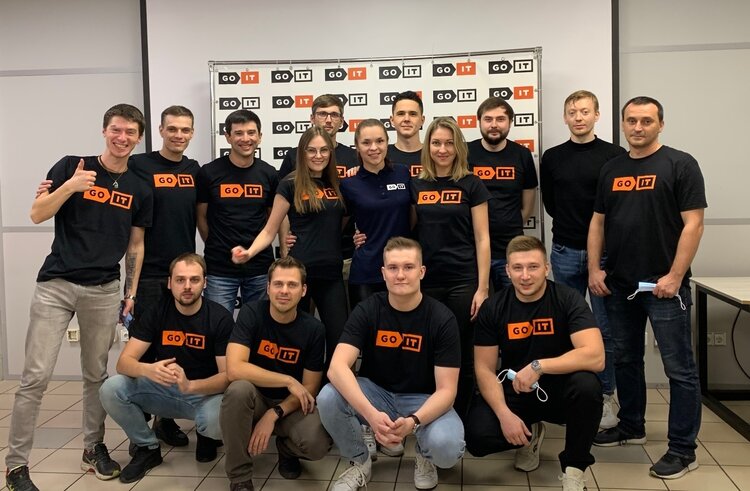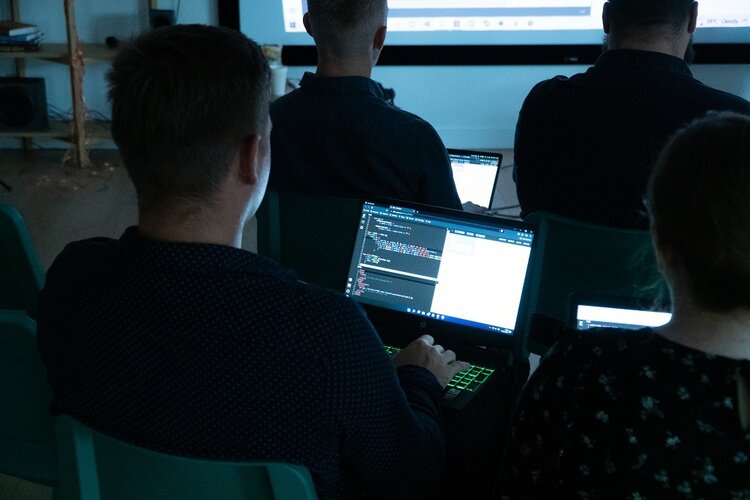"Out of the basement emerged with 8 products": How GoIT managed to grow 2.5 times during the war
And why did the company launch an IT Master programme?

"Nearly half of the Ukrainian IT sector are specialists who haven't completed university. We want to compete with state educational institutions because their educational programmes are too outdated," says Anton Chorny, co-founder of GoIT. Will the company be able to compete with universities? Why did the IT school launch a master's programme? How does the company survive during the war? And what does Kazakhstan have to do with it? Anton Chorny, co-founder of GoIT, told Mind all this and much more.

About the history of creation
The history of the GoIT school began in the crisis year of 2014. Anton Chorny, the CEO of the company, explains that it was during that time when Ukraine experienced a boom in transitioning to the IT field, and the creation of educational courses was a response to market demands. "We were among the pioneers in the IT switchers market," says the interlocutor.
With minimal investments of tens of thousands of hryvnias, the founder Roman Korytsky started seeking the first clients. Anton Chorny became the CEO and co-founder in 2017. With the help of a partner client base, the young company managed to attract its first students. "For example, Chasopys coworking space was sending information about GoIT events taking place in their environment to their clients," says the co-founder.
Initially, the founders themselves conducted individual interviews with students. The first group was taught offline in Kyiv, but during the COVID-19 pandemic, the company completely switched to online. Currently, GoIT is a group of edtech companies operating in six markets. In addition to IT training for switchers, the company offers courses for teenagers aged 7-17 called GoITeens and a master's program called Neoversity.
About education
"Now we don't communicate with each individual. It would be a bit complicated," laughs Anton Chorny. In the educational process, the company uses the "70, 20, 10" methodology, which is based on the distribution of students' skills: 70% are acquired through practice, 20% through mentoring and feedback, and 10% through theoretical learning. "You can read Jamie Oliver's book on how to make a fantastic mushroom cream soup, but if you just read it and don't try it, you'll only have 10% understanding of how to make it tasty," compares the speaker. Students work with the Learning Management System platform, where all materials are stored: e-books, mini-tasks with code auto-check, and homework assignments.
The training programme is built around four types of skills: technical, career-oriented, soft skills, and English proficiency in the IT field. Each program consists of modules, with one module per week.
"To become a successful graduate, on average our students study for 15 hours per week, with 5 hours dedicated to coding," explains the company's CEO. Depending on the course, the training program can last from three to ten months. The Neoversity Master's programme, which the company recently launched, lasts for two years.
Anton Chorny says that initially creating such a programme was a dream. Five years ago, it was beyond the capabilities of a team of 40 people to launch an online university. As the company grew, it launched an IT Master's programme in collaboration with the international education institution Woolf, certified in the EU.
"We started creating startups with graduates and noticed a significant difference between developers and engineers. To create our own project, we need engineers who have learned multiple programming languages and possess algorithmic thinking. Such individuals emerge after prolonged education," notes the speaker.
About employment and the market
During their studies, students have access to a career centre. At the beginning of the course, the centre conducts a survey among students according to their goals and provides feedback. Following this, sessions are held where career consultants teach basic skills such as crafting CVs, writing cover letters, and filling out LinkedIn profiles. After completing the course, the career centre continues to engage with students for another six months, offering vacancies from the partners.
The company has its own web studio, with 70-80% of the staff being graduates. Some students are invited for internships. Graduates work in over 850 companies.

According to Anton Chorny, the hiring rate remains high. "The market has been very competitive. So, while the competition has increased, it is still possible to find a job. More and more students come to us from abroad and find employment there," he adds. During the war, 1,400 GoIT students in Ukraine found jobs in the IT industry, with over 600 of them finding employment in 2023.
"Even now, the job is looking for middles and seniors by itself. Mostly, if professionals want better working conditions, they start looking for other jobs. However, juniors still need to spend some time to get their first offer. 'Vacancies are available, but the time spent on job hunting has increased,'" explains the interlocutor.
About competitors
According to CEO Anton Chorny, the company distinguishes itself from competitors through its free trial business model. "We offer students a free week of learning. During this time, they can complete a project and determine if the profession suits them," explains the company's CEO.
The biggest competitors for GoIT's users he considers to be YouTube videos and Netflix series. "YouTube is a direct competitor because it provides a vast amount of information. However, most people cannot learn and get a job independently without undergoing a specialised course and receiving assistance from instructors and mentors, especially in the programming field where textual material is more important than videos. Additionally, YouTube contains a lot of outdated information that can mislead newcomers," explains Anton Chorny. He adds that Netflix is a competitor because it offers entertaining content that can distract students from their studies.
Universities are also considered competitors by the company. "We would love to enter into competition with public educational institutions because their programs are even older than those on YouTube," says the interlocutor. Among private companies, there are over 100 players in the market offering their own educational courses. However, according to Anton Chorny, the market is already segmented, and they are not direct competitors.
About the full-scale war
February 24th didn't put all company processes on hold. "People who work with clients were already in Lviv, so we didn't have any downtime or delays," recalls Anton Chorny. However, challenges for the company arose later. During the first month of the war, the company relocated 100 families of its employees to Lviv. Considering that GoIT had long abandoned offices and operated online, finding accommodation for all the people became a challenge.
When the blackouts began, the company had to ensure the workflow: instructors had to conduct 3–4 classes every day, and mentors had to quickly respond to homework assignments. The company gathered all willing people in Yaremche. "Everything necessary was organised there, including the purchase of diesel generators and the arrangement of workspaces," the interlocutor explains.

As soon as the war started, the team realised that there was no one to call and offer courses in Ukraine because people had other priorities. "To avoid sitting idle in basements in Lviv, we started operating in Kazakhstan. We didn't want to work there, but we understood that our sales department could operate in that market. Once the market in Ukraine recovered, we stopped selling there. Our goal was to preserve the team and not tell people that they were going on unpaid leave," notes the interlocutor. Overall, the company worked there for about three months.
Despite this, during the full-scale war, the company grew 2.5 times. What led to this success? Anton Chorny assures that while sitting in basements, the team didn't waste time and emerged with eight new products. "But, of course, international expansion played a significant role. Over the past year, we have experienced substantial growth in Poland, and other countries have started to develop as well," he explains.
About markets and investments
In the beginning, the founders invested tens of thousands of hryvnias into the company. Currently, the company reinvests almost all of its profit into development, including opening new locations. With the start of the full-scale war, GoIT began expanding its geographic presence. The company operates in six markets: Ukraine, Poland, Romania, Mexico, Colombia, and the Philippines.
When choosing new locations, the team considers several criteria: the availability of an adequate number of IT job vacancies and the wage gap between programmers and representatives of other professions. For example, in Ukraine, the average salary of an IT professional can exceed the salary of other professions by 7–8 times. In addition, there are countries that are similar to Ukraine in terms of mentality and have significant IT potential, such as Poland and Romania. "Growth occurs more easily in foreign markets. In Ukraine, we are growing from certain volumes, while we start from scratch in new locations," explains Anton Chorny.
According to him, opening a new market requires preparation over a period of 4–6 months. The required amount to open a location can vary depending on the specific market, but on average, it ranges from 4 to 8 million hryvnias. The company plans to become a leader in Eastern Europe and enter the top 3 in Southeast Asia.
If you have read this article to the end, we hope that means it was useful for you.
We work to ensure that our journalistic and analytical work is of high quality, and we strive to perform it as competently as possible. This also requires financial independence. Support us for only UAH 196 per month.
Become a Mind subscriber for just USD 5 per month and support the development of independent business journalism!
You can unsubscribe at any time in your LIQPAY account or by sending us an email: [email protected]


